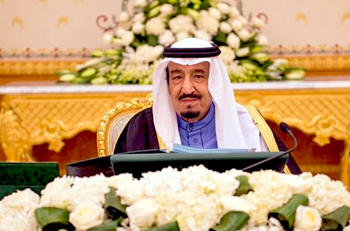Riyadh, Feb 3: Chairing his first Cabinet meeting as monarch and Custodian of the Two Holy Mosques on Monday, King Salman said that Saudi Arabia’s foreign policy would remain in place.

Saudi Arabia’s policies in relation to Arab, Muslim and international countries “will remain unchanged,” the king said during an address to the Cabinet. “We will work hard in the service of Islam, for the betterment of our loyal and noble people and support Arab and Islamic causes,” he said.
“We’ll also work to promote international peace, security and global economic growth and pray to the Almighty to help us shoulder this responsibility and trust in a way that pleases Him,” the king said.
At the outset of the meeting, King Salman said he shared the pain of the Saudi people, and Muslim and Arab nations, over the death of King Abdullah, and prayed for Allah’s mercy and forgiveness for the late king. He thanked world leaders for their condolences.
King Salman noted King Abdullah’s contributions including the expansion of the two holy mosques, the dissemination of the Holy Qur’an, and his prominent role in supporting justice across the world.
“We and the whole world have lost a unique leader who committed his life to achieving overall prosperity for his country and its people, including building edifices of science, finance and knowledge ...”
He said King Abdullah had always supported the rights of the oppressed and made a “brave and effective contribution for the consolidation of peace, security and stability throughout the world.”
King Salman said he would continue to abide by the policies set out by King Abdul Aziz and the other rulers who followed him. This includes adhering to Islamic precepts.
King Salman praised the Saudi people for standing united in times of difficulty. This attitude would ensure a bright and prosperous future for the country, he said.
New Minister of Culture and Information Adel Al-Toraifi said that King Salman welcomed the new ministers including Crown Prince Muqrin and Prince Mohammed bin Naif, who was appointed as deputy crown prince and still holds the Ministry of Interior portfolio.
The king thanked the former ministers for their contribution and urged the new ministers to put the interests of the nation and citizens at the top of their priorities.
King Salman briefed the Cabinet on the outcome of his talks with US President Barack Obama, which he said was aimed at expanding bilateral relations in all areas.
After reviewing a report submitted by the Bureau of Investigation and Public Prosecution (BIPP), the Cabinet approved amendments to several of the organization’s regulations.
The Cabinet urged the Saudi Commission for Tourism and Antiquities to license buildings to house Umrah pilgrims and visitors in Makkah and Madinah, provided they fulfill municipal and Civil Defense requirements. The move is to encourage investment in such buildings.
The Cabinet approved the Ministry of Finance’s system to extend loans for hotel and tourism projects that are established in less developed cities and provinces or in new tourist destinations. The maximum limit of the loan shall be equivalent to 50 percent of the project cost and not exceeding SR100 million.
The Cabinet appointed Hindi bin Naif bin Humaid, Saad bin Saleh Al-Saleh, Essam bin Abdul Aziz Al-Muhanna, Majed bin Abdul Aziz Al-Dries and Adel bin Abdulmohsen Ba-Basil ministers plenipotentiary at the Foreign Ministry. It also approved an agreement with Jordan for cooperation in municipal affairs, to exchange knowledge and experience.






Comments
Add new comment